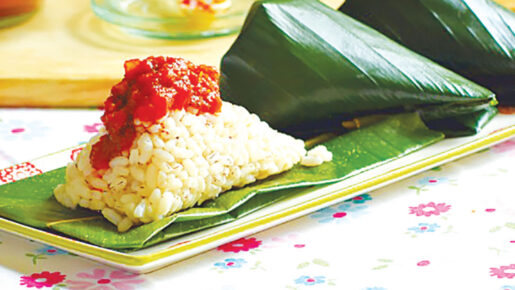Wrapping leaves, in response to a recent ban on single-use plastics by the Lagos state government, restaurants, fast-food establishments, and eateries across the city are actively seeking alternatives. Among the proposed solutions, wrapping food in leaves has emerged as a promising option, suggested by agriculturists as a sustainable and eco-friendly alternative to Styrofoam and other plastics.
The ban, announced by the Commissioner for the Environment and Water Resources, Tokunbo Wahab, aims to address the environmental menace posed by single-use plastics, particularly non-biodegradable Styrofoam. In light of this decision, businesses are exploring innovative ways to adapt and comply with the new regulations while continuing to serve their customers.
One alternative gaining traction is the use of leaves for wrapping food. This suggestion, put forward by agricultural experts, not only addresses the environmental concerns associated with plastic but also offers economic and nutritional benefits. Wrapping food in leaves is not only a healthy option but also a cost-effective solution for businesses of all sizes.
The Chief Executive Officer of Renee Golden Multiventures, Lagos, Adenike Apeji, has endorsed the use of wrapping leaves as a fantastic and nutritious alternative. Apeji highlights the nutritional advantages of using leaves, emphasizing that they not only enhance the flavor of the food but also contribute to its nutritional value. Moreover, using leaves as food wrappers aligns with traditional practices and promotes sustainability in food packaging.
The use of wrapping leaves is deeply rooted in African culinary traditions, where certain plant species are utilized for their suitability as food wrappers. These leaves, commonly known as Ewe Eran (Thaumatococcus Danielli) and Ewe Gbodogi (Megaphrynium Macrostachyum), are commercially exploited by local farmers and traders. Despite their similarity in appearance, these leaves serve the same purpose of wrapping various foods and other items.
Beyond their culinary use, these leaves also have economic significance for rural communities in Nigeria. They contribute to the livelihoods of local farmers through their cultivation and commercialization. However, challenges such as low genetic variation, increased mortality rates, and susceptibility to disease have led to a decline in their cultivation.
To address these challenges and harness the economic potential of wrapping leaves, there is a need for concerted efforts from government and other stakeholders. Encouraging more farmers to cultivate these plants, investing in research to improve cultivation practices, and promoting sustainable harvesting methods are essential steps towards preserving and maximizing the benefits of wrapping leaves.
While the adoption of wrapping leaves presents opportunities for businesses and farmers alike, there are practical considerations that need to be addressed. Proper handling and cleaning of leaves to prevent contamination, as well as addressing concerns about durability and storage, are crucial factors to ensure their viability as a packaging alternative.

Wrapping leaves
In conclusion, the use of wrapping leaves as an alternative to single-use plastics represents a sustainable and culturally resonant solution to the environmental challenges posed by plastic pollution. By embracing this traditional practice, businesses can not only comply with regulatory requirements but also contribute to the preservation of local traditions and the promotion of sustainable agriculture.
Source: guardian.ng










